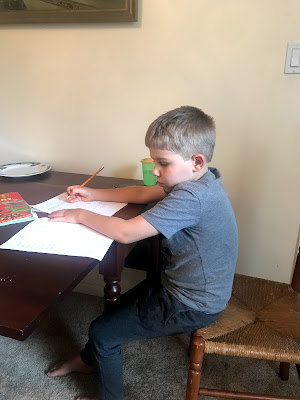Lyndon's Conference Part 3: The Reaction to the Conference
Last post about the conference. We wanted to share the Columbia student body's response to the conferene. One student who attended wrote an op-ed that was printed in the Columbia student paper, Columbia Spectator. Here it is.
Prejudgment skewers debate
This past weekend, Lerner Hall was host to the Family in Modern Society Conference, arranged by students here at Columbia. The conference featured speakers from various universities who spoke on a multitude of topics, including the socioeconomic benefits of stable families, the differences in the adult quality of life for low-income children in married and unmarried families, and, yes, a defense of “traditional marriage.” If you were to ask around campus, you could very easily get the impression that a conclave of fundamentalist, homophobic demagogues was holding the conference. As I left my dorm to head to the conference’s opening session, I was actually asked if I was going to that “anti-gay thing.” As a supporter of marriage equality, I found the slander—unintentional as it was—to be particularly stinging.
Prejudgment skewers debate
Well-founded,
informed speeches should not meet protest and a refusal to listen.
By Kyle
Dontoh Published
February 17, 2013
This past weekend, Lerner Hall was host to the Family in Modern Society Conference, arranged by students here at Columbia. The conference featured speakers from various universities who spoke on a multitude of topics, including the socioeconomic benefits of stable families, the differences in the adult quality of life for low-income children in married and unmarried families, and, yes, a defense of “traditional marriage.” If you were to ask around campus, you could very easily get the impression that a conclave of fundamentalist, homophobic demagogues was holding the conference. As I left my dorm to head to the conference’s opening session, I was actually asked if I was going to that “anti-gay thing.” As a supporter of marriage equality, I found the slander—unintentional as it was—to be particularly stinging.
Earlier
in the week, I had received an invitation to take part in
a family-and-marriage-conference" pro-LGBT rights
rally on campus and had considered going, unaware that the event
being protested was the conference that I was planning on attending.
As I approached Lerner, I was slightly confused about the intent of
the picketers—I hadn’t been under the impression that this was an
anti-gay conference.
The
lectures were thoughtful and incisive—so much so that I quickly
discarded my original plan of staying for a few sessions before
returning to work. The speakers, to a T, were academics who based
their arguments and presentations on facts and reason, not on bigotry
or prejudice. Only one speaker, author Dawn Eden, made an argument
based on religious grounds, and her lecture, “Everything is
Tolerated and Nothing is Forgiven,” was about chastity and dealing
with the excesses of permissiveness, not about the LGBT community.
Only three speakers broached the issue of same-sex relationships, and
only two of those three explicitly passed judgment on these
relationships.
Even
then, the arguments were made on strictly rational grounds. Lynn
Wardle outlined the case for traditional marriage on the notion that
the family was the original, fundamental building block of society as
envisioned by the Founding Fathers. Disagree as I may, this was not
the rambling of a bigot. This was a reasoned, principled argument
based on a fundamental respect for the LGBT community coupled with a
specific interpretation of American history.
As
I listened to the issues—both agreeing and disagreeing at times—I
felt a particular sense of excitement, picking up viewpoints I have
seldom heard since coming to Columbia. I couldn’t help but notice
something else as well, though. The room was, at best, half-full, yet
I had been told that the event was sold out. It was revealed,
eventually, that many of the tickets had been taken by the Columbia
University Democrats, of all groups. I was predictably confused as to
what the Democrats would want to do with a conference like this. Yet,
perhaps more pressingly, I wondered, “Where are they?”
They
eventually made an appearance, albeit well into the afternoon, during
Sherif Girgis’ lecture. They stood silently, holding up signs
advocating marriage equality and tolerance, as Girgis, a Rhodes
Scholar and J.D. candidate at Yale, made his case for marriage as
between a man and a woman. When he was done, they left. Still,
despite the protest, a large number of seats had remained unfilled.
Throughout the day, a few students trickled in, asking about the
conference, and were invariably seated because of the sheer surplus
of space. Many more at Columbia and in the community, however, were
denied this chance, even if this was not the intent of the Democrats
when reserving tickets in bulk.
From
the start, the CU Democrats seemed misinformed—if not intent on
spreading misinformation—about the purpose of the forum. It was
not, as some that day said, an “anti-gay marriage tirade,” but a
debate on the status of the modern family. The lectures did not
express mainstream American thought, or even liberal thought. In his
State of the Union address last week, President Obama called for
“removing the financial deterrents to marriage for low-income
couples, and doing more to encourage fatherhood—because what makes
you a man isn’t the ability to conceive a child, it’s having the
courage to raise one.” Despite this, the issue of the future of the
family is a conversation that the CU Democrats seem unwilling to
allow to take place, much less to take part in, despite their
physical presence.
Our
university benefits from pluralism, a free exchange of ideas, and the
constant intercourse between competing schools of thought. Sometimes,
a moral consensus emerges—such as the heartening decision of many
of the Ivy
League Democratic and Republican associations to endorse marriage
equality. But
a consensus is not a golden rule; It is not fixed. It should not be
immune to debate. I happen to agree with that consensus, but when we
place name-calling, intimidation, and disruption above an honest
discussion of the issues, we all lose.
The
author is a Columbia College first year.
.JPG)


Comments
Post a Comment